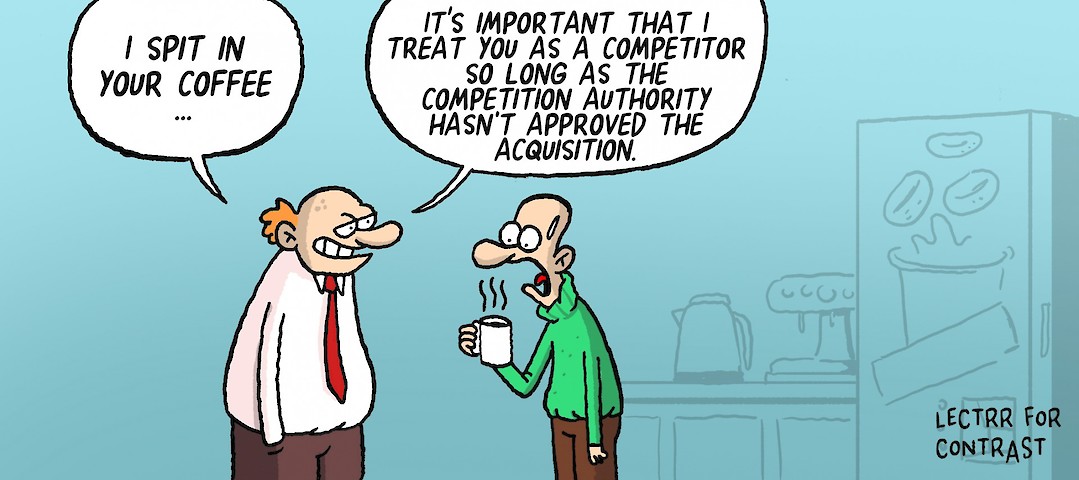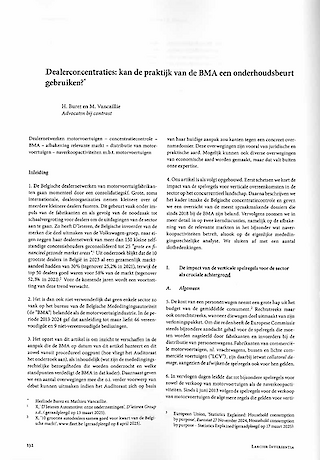In the Picture

Ready, set, stop… Go!
February 2017Imagine…
For some time now, you've had your eye on a company that you want to acquire. After long negotiations, all of the wrinkles have finally been ironed out and you arrive at a (signed) contract. You can't wait to get down to work . . .
However, your advisors say that you'll have to remain patient for a little bit longer, because the transaction first has to be notified to the European Commission, which must approve the acquisition.
In line with that advice, you promptly postpone the transfer of the shares while awaiting this formal approval. In the meantime, however, important commercial decisions need to be made in the company you intend to take over. It’s about to launch a new product. Because you have a very clear vision about this and because there’s already an agreement, you exchange ideas and the final decision about the launch is submitted to you for your OK.
Six months later, the acquisition is approved by the European Commission, the shares are transferred and the newly-launched product is selling like hot cakes. Until one day, the competition authority unexpectedly shows up at your door with a search warrant. They want to investigate whether there was any gun jumping: a competition law violation that is sanctioned by a heavy fine.
You almost fall off your chair. What?… “gun jumping”, competition law violation? But . . . the European Commission approved the acquisition, and you’d postponed the transfer of shares until you received this approval?
A brief clarification.
A concentration (in the form of an acquisition, merger or joint venture) must be notified and approved as soon as it exceeds certain turnover thresholds. Depending on the turnover, the notification is made to the European Commission or to one or more national competition authorities. This is what is called “control of concentrations”.
There is also a standstill obligation which applies. A concentration may not be implemented before it is approved by the competent competition authority (or authorities). If this nevertheless does take place, then there is gun jumping; the impatient companies have bolted off too quickly from the starting blocks, as it were. That is also the case if the parties fail to notify the concentration.
The standstill obligation goes further than postponing the change of control by formally suspending the transfer of shares or assets while awaiting the required approval. The obligation also applies on the commercial level. The companies involved must behave independently of one another until the competition authority has given the formal starting shot. If that doesn't happen, then there is gun jumping and the parties expose themselves to possible fines.
For example, the French competition authority recently decided that an acquiring company had violated the standstill obligation because it had interfered too heavily with the commercial and operational decisions of the companies being taken over. Its top management e.g. approved major decisions and a new joint project was prepared. This was accompanied by the exchange of sensitive information. The French competition authority conducted searches and ultimately imposed a total penalty of 80 million euros.
By contrast, no gun jumping is involved when the companies concerned take legitimate steps to plan and prepare the concentration with a view to ensuring continuity (in the event of an acquisition or merger) or facilitating a smooth start (in the event of a joint venture).
Concretely.
- Always check carefully whether a concentration has to be notified to the European Commission, or to one or several national competition authorities, on the basis of the turnover of the companies involved.
- If a concentration does have to be notified, no change of control may take place until after approval. The transfer of the shares or assets must be postponed.
- On the commercial level as well, the companies involved must continue to behave independently of one another until the necessary approval has been received. Interference in one another's commercial decisions or the coordination of activities is an absolute no-no. Also make sure that no sensitive information is exchanged between the parties.
- It is permitted to take legitimate steps in order to prepare and plan the period after the transfer.
- The control of concentrations, and thus also the control of gun jumping, can differ from Member State to Member State. Always check precisely what rules apply.
Want to know more?











